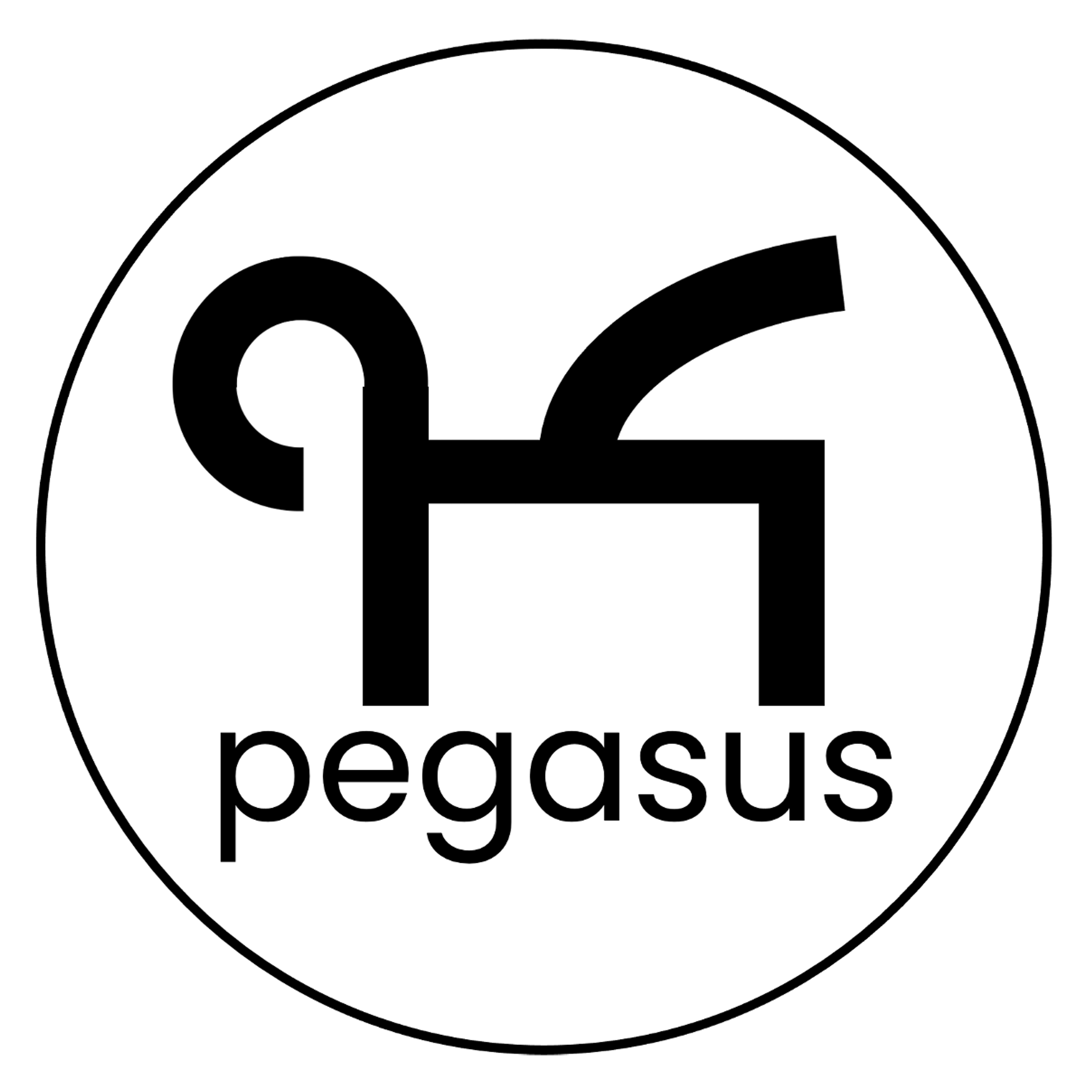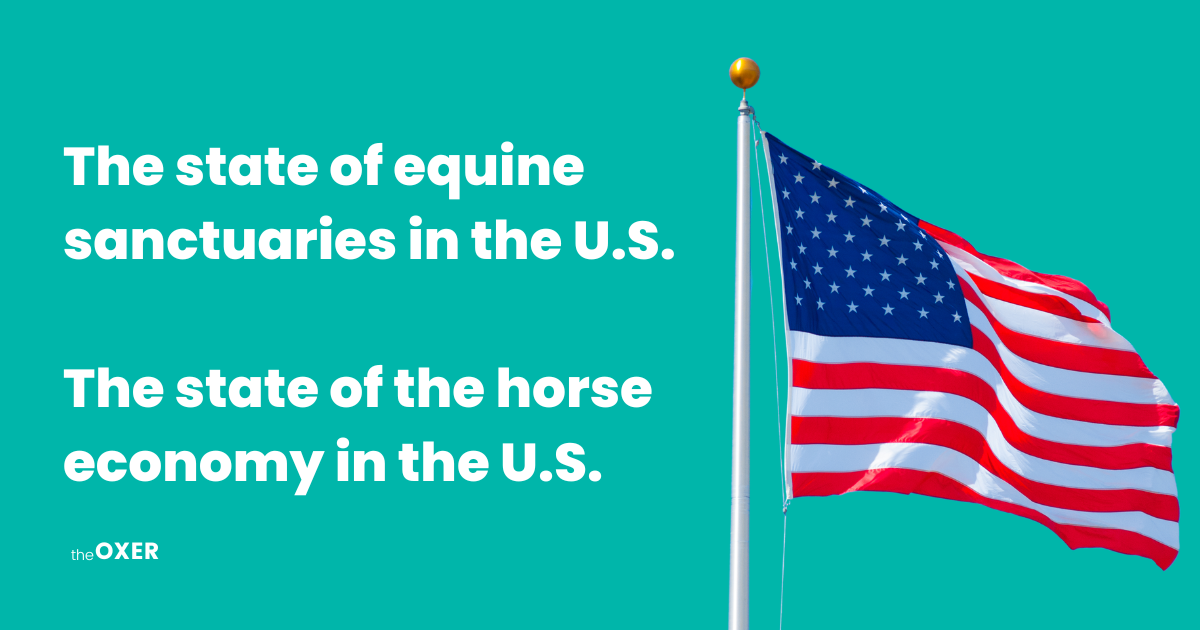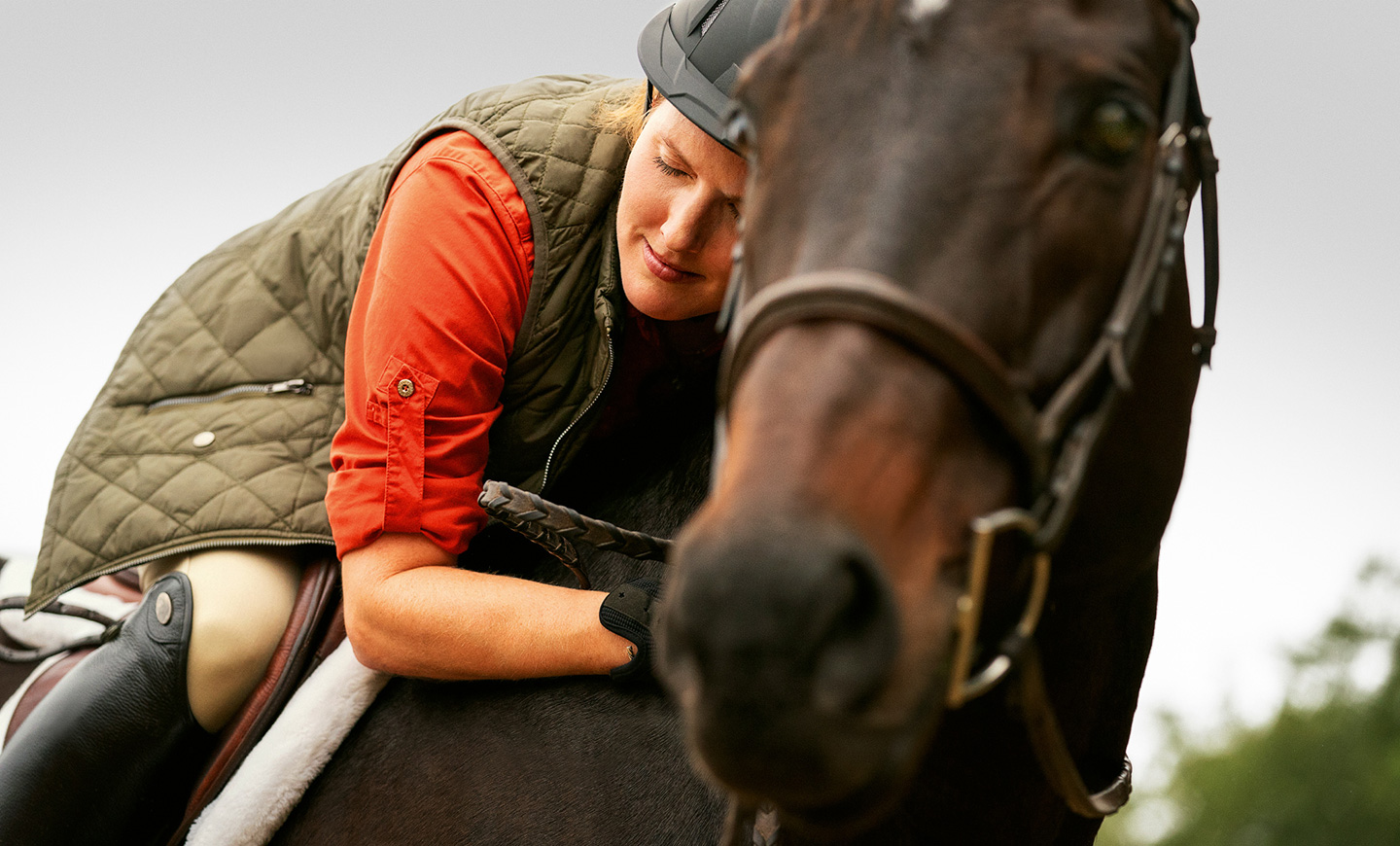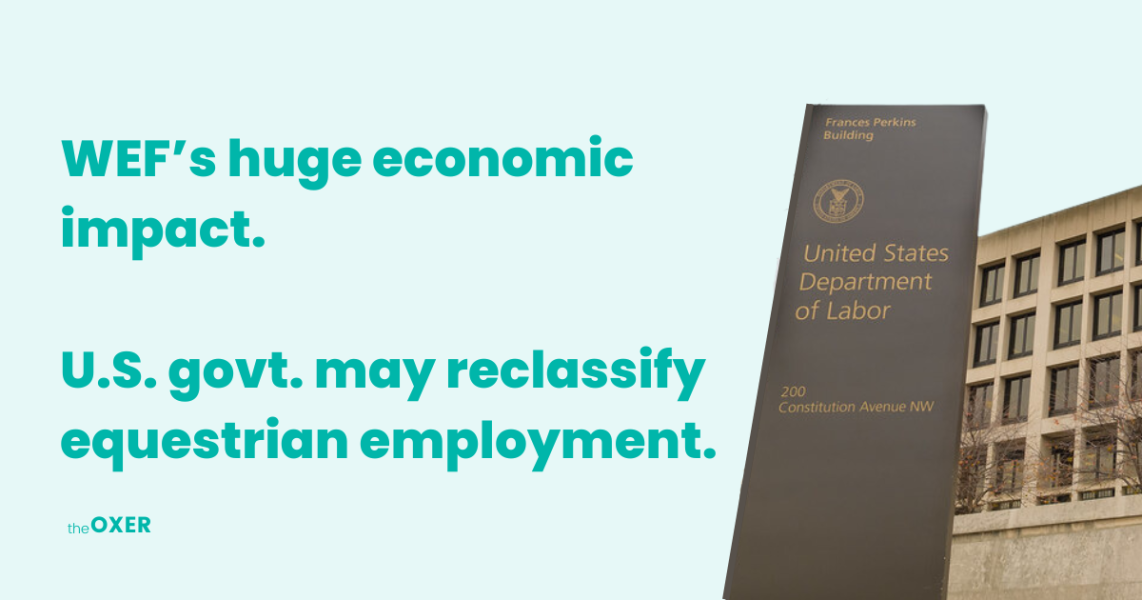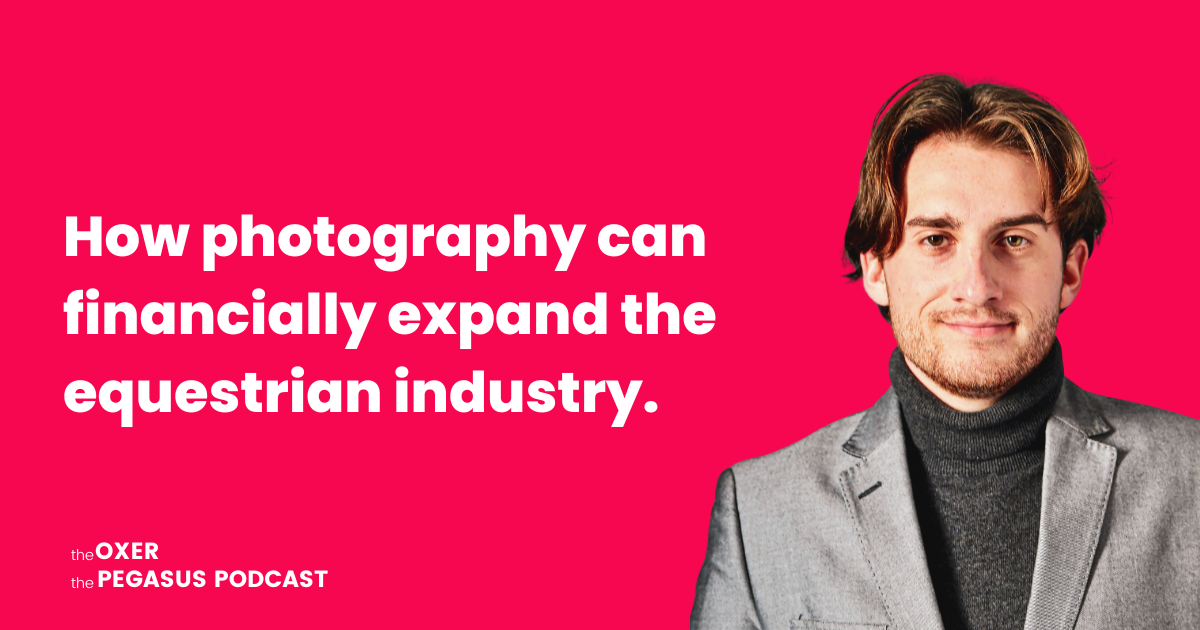Hey there, partner. This is The Oxer by Pegasus. The newsletter that takes you out of your tack room and into the global equestrian industry. 🐴 Here’s what we’ve got for you today: 🏠 A new report on equine sanctuaries in the U.S. is out: What it says about how our beloved breeds are being treated. 💸 The American Horse Council‘s Economic Impact Study is finally here: We cover the most impressive findings from the study below. ✈️ Continue vicariously traveling through China’s equestrian industry: Read about findings and insights we shared in our Oxer edition after the podcast came out. 🎬 Final Foals: Check them out after the second story of this edition. Before we get into it, have you signed up to try out Pegasus’s beta? If not, head to Pegasus, click “get early access,” and sign up today! Saddle up to learn a lot in today’s edition. ⛲️ What the State of Equine Sanctuaries Looks Like Across the U.S. The Equine Welfare Data Collective (EWDC) has published its sixth report, revealing insights into equine welfare based on data from 2022. The report indicates a shift in reasons for equine intakes and outcomes, suggesting changes due to the pandemic’s aftermath. Key findings include increased law enforcement confiscations, a slight decrease in owner relinquishments, and changes in adoption rates. Nevertheless, in most areas over half of the equines received were due to the previous owners giving them up. In 2022, agencies offering direct rehoming services fulfilled 65% of all requests they received. Among these fulfilled requests, 89% were for assistance in finding new homes for horses. A horse jumping over a hurdle in a competition. There isn’t information suggesting why 35% of requests that were received were not fulfilled. Yet one could imagine that it might be because the requests themselves weren’t suitable for equine sanctuaries to take on, or maybe that the equine sanctuaries themselves weren’t able to take such requests due to limited resources and capacity. Support for feed and veterinary care remains the top assistance requested from organizations. While the fulfillment of veterinary care needs in 2022 mirrored those of 2021, only 44% of feed assistance needs were met, a significant drop from the 94% fulfillment rate the previous year. This reduction could be attributed to either an increase in requests or a decrease in available resources, though the exact cause remains uncertain. The report highlights the impact of COVID-19 on horse welfare organizations and emphasizes the need for ongoing support and data collection to address the challenges facing at-risk equines. Reports from EWDC highlighted that rescues and animal control officials faced staffing challenges due to the pandemic, impacting their ability to report data effectively. As a final note on this, the study’s organizer, the EWDC, is a program under the United Horse Collective which is also under the American Horse Council. Which leads us to our next story. Some of the Best Things We Found in the Anticipated AHC Study Once every handful of years, the American Horse Council (AHC) publishes its highly vetted Economic Impact Study. The 2023 study is finally here, being the first time AHC published an economic impact study since 2017. Let’s look into some of the most interesting feats from the study.| Before we get into this year’s study, it’s worth noting what the American Horse Council actually does, which President Julie Broadway gets into the nitty gritty about on The Pegasus Podcast. Very quickly, the AHC is an organization based in Washington, D.C. that collaborates with partners throughout all equine-related industries to lobby for our interests on Capitol Hill. Additionally, the AHC serves as a source for better understanding what all of the varying equine industries look like from a statistical perspective. It’s worth noting that the AHC partners with Innovation Group which is a firm that specializes in gathering large-scale data on industries such as ours. The maintenance of the United States’ estimated 6.7 million horses, combined with expenditures by horse enthusiasts on events and recreational activities, significantly contributes more than $74 billion to the nation’s Gross Domestic Product. To put this in perspective, America’s horses have a GDP of $10 billion more than the GDP of Serbia, and have a bigger GDP than tourist haven Croatia and the British region of Northern Ireland. Horses lead to 1.3 million jobs in “direct employment”, meaning that this statistic does not count for the jobs that horses bring that aren’t exactly working with them, such as a vendor at a show. If we were to count those “indirect” jobs, too, the total number of jobs that horses add to the economy is 2.2 million. That’s almost equivalent to the population of Miami. One more fascinating fact from this year’s study is that almost a third of households in the U.S. contain at least one horse enthusiast. This brings into question how “niche” horse sports are. If you want to read all of the insights that the study has to offer, you can purchase it here on the American Horse Council‘s website. 🐴 This Week’s Final Foals 🏈 A horse predicted that Taylor Swift would win the Super Bowl, and she did. 🙀 Equestrians can love anime, too! 💻 Try Pegasus’s beta today by signing up on the form on our homepage. 📱 Follow Pegasus on Insta, TikTok, and YouTube Shorts. Take your time to digest these stories and let us know what you think by replying. Your bit is dirty, The Oxer by Pegasus
What Explains the Recent Emergence of the Chinese Equestrian Industry?
Hey there, partner. This is The Oxer by Pegasus. The newsletter that takes you out of your tack room and into the global equestrian industry. This week, we published our podcast with Shanghai-based Zoé Tingting QUIN 覃婷婷, the founder and CEO of WonderHorse. In today’s edition, we want to uncover the relatively recent boom of equestrian sports in China. Before we get into it, have you signed up to try out Pegasus’s beta? If not, head to Pegasus, click “get early access,” and sign up today! Without further ado, let’s discover opportunities within China’s equestrian industry . 💥 China’s Recent Equestrian Boom Can Thank 2008 + Government Policy Individual jumping at the 2008 Olympics. 2008 was the year in which China had the Summer Olympic Games in Beijing. What many do not know, however, is that China as a competitor never competed in Olympic equestrian sports until that same year—highlighting China’s recent arrival to our world. In just a decade after the 2008 Beijing Olympics, the number of equestrian clubs has skyrocketed from 100 to 1,400. It has grown even more than that in the latter half of the 2010s. Growth of equestrian clubs in China. It can be said then that the presence of the Olympics in China had a large impact on their burgeouning equestrian scene. However, the rise of equestrian in China didn’t happen merely because of the presence of the Olympics in 2008. The Chinese government’s approachto bolstering the equestrian industry has been multi-faceted and strategic, focusing on planning, improving, and promoting the sector to ensure its rapid development and sustainability. Their initiatives unfolded through various policy releases aimed at establishing a well-defined structure for equestrianism within the national sports reform framework and related horse fields, ultimately fostering the industry’s healthy growth. A key milestone was the release of Document “No. 46” in October 2014, aimed at supporting the sports industry’s growth, followed by the State Council Document No. 85 in 2015, which provided guidelines for developing the sports service industry. These documents contributed to a surge in investment within the sports sector, aligning with national strategies yet highlighted the challenge of sports venue scarcity. The 13th Five-Year Plan, introduced by the Central Committee of the Communist Party of China, emphasized green development and modernization patterns that harmonize human and nature relationships, aligning with equestrianism’s environmentally conscious principles. The plan recognized equestrianism’s potential to promote outdoor recreation, rural development, and cultural preservation, integrating sustainable practices into the national development agenda. National policies from 2015 onwards actively formulated strategies for equestrian sport development at all government levels. The “National Fitness Plan (2016–2020)” highlighted equestrianism as a sport to be cultivated, supported by the “No. 77” document from the State Council, which forecasted a substantial growth in the sports market. These policies aimed to decentralize sports activities from urban areas, advocating for the development of equestrianism among other high-value sports industries. Specific regions with historical ties to horse culture, like Xinjiang and Inner Mongolia, issued policies to bolster equestrian clubs and related industries, further solidified by the Guangdong-Hong Kong-Macao Greater Bay Area Development Plan in 2019, which emphasized the growth of equestrian sports and industry cooperation. 🇨🇳 The Rise of Chinese Equestrian TourismShow jumping in Hong Kong. Show jumping in Hong Kong.. Government planning of the country’s equestrian industry and interest from the 2008 Olympics aren’t the only reasons why horseback riding is growing so rapidly in China. This growth is part of a broader trend of rising affluence and interest in equestrian sports supported by domestic tourism. Equestrian tourism in China is currently experiencing significant growth, particularly driven by the country’s rich cultural heritage and an increasing interest in outdoor and leisure activities. The Xinjiang Uygur Autonomous Region is highlighted as a focal point for this development, leveraging its extensive history with horses and vast natural landscapes. The region is home to the “Yili Heavenly Horse Species,” a breed renowned both domestically and internationally, underscoring the potential of equestrian tourism in the area. Xinjiang boasts about 894,000 horses across six breeding farms, making it a leader in China’s horse industry. Of about 3.67 million horses across two-thirds of the country, more than 100,000 horses are also used for tourism and leisure activities, with 30 million rider experiences every year Independent UK, June 2022 Horse tourism throughout the country has had output value of over 60 billion yuan ($8.4 billion). 🏋️♀️ The Challenges Chinese Riders Face Today All of this is to say that the horse sports that equestrians in the West participate in are relatively new as an industry in China. It’s not just in China, however, we learned from our feature with Morgan Froment that other countries in the region—such as Thailand or Cambodia—are also rapidly developing their equestrian industries. What do countries like China, Thailand, and others in the region have in common other than seeking to grow their equestrian industries? All of them are looking to bring foreign talent to their equestrian hubs. In our recent interview with Zoe Quin, she mentioned that there are fewer horse trainers from foreign countries in China today than before possibly due to their heavy travel restrictions during the pandemic. Once restrictions were lifted in March of 2023, clubs immediately started looking to hire foreign coaches. Another point made on the podcast that serves as a challenge in China did not come from our guest but from one of our cohosts, Pegasus cofounder Sam Baynes. Sam mentioned his thoughts on what an American businessperson would think of doing business in China; or, better said, what an American businessperson would not be able to understand, as they wouldn’t even know where to start. “If I’m an American [and] I’ve never done business in China before, my thought process would be that if I sell tack and apparel, then I know for a fact that I probably produced most of my tack and apparel in China. I have it shipped to the States, and then I deliver it
What the Chinese Equestrian Industry Looks Like as of Now
Happy Monday partner, Let’s start off the week with another episode of The Pegasus Podcast. Zoé Tingting QUIN 覃婷婷 is the founder and CEO of WonderHorse, a platform for the Chinese equine community. In the aftermath of COVID, Zoe brings compelling insights into the resilience and transformation of this niche yet burgeoning sector. From the adaptability of equestrian clubs to the unwavering passion of China’s middle and upper classes for horse riding, our discussion unpacks the trends that define the current landscape. Wonder Horse’s strategic pivot from consumer-facing services to B2B consulting emerges as a beacon for foreign brands seeking to navigate the intricacies of Chinese market entry, guided by Zoe’s expertise. Zoe shares her observations on the disciplines captivating China’s riders, revealing the dominance of jumping, the ascent of dressage, and the nuanced popularity of eventing, set against its international victories. In this episode, we discuss: The tug-of-war between the prestige of European equestrian brands and the emerging local alternatives vying for attention. The evolution of sporting preferences in China. The soaring demand for foreign trainers and their irreplaceable presence in Chinese equestrian clubs And more. Listen to it on Spotify, Apple, or any other podcast platform. Cheers, The Pegasus Team
The Power of Horse-Human Connections
By Liberty Getman, DVM, DACVS, Equine Technical Services, Zoetis, and Bobby Cowles, DVM, MS, MBA, Managing Veterinarian, Equine Technical Services, Zoetis Anyone who’s spent enough time around horses knows there’s a strong, uncommon bond between our species. Through a millennia-long partnership that dates to 3500 B.C., we’ve developed a unique, unspoken language that offers a profound level of understanding between one another. And now, research on this phenomenon validates what many of us horse owners intuitively know, the horse-human connection can be instrumental in one’s healing journey, whether working to improve a person’s physical or mental health and well-being. At Zoetis Equine, quite a few of us on the veterinary technical services, marketing, sales and leadership teams are in fact horse owners ourselves (or aspiring ones!). We can attest to the sense of calm and “present-mindedness” experienced with a quick trip to the stable. This common thread experience is one of the key drivers behind our relentless pursuit to help improve the health of horses, thus also supporting the veterinarians and horse owners who care for them. In fact, we’ve strategically partnered with several organizations who share in our mission to spread awareness around the power of horse-human connections. We’d like to take a moment to spotlight these equine industry leaders: The Professional Association of Therapeutic Horsemanship International Zoetis Equine is proud to serve as the official health and wellness partner of the Professional Association of Therapeutic Horsemanship International (PATH Intl.), an organization committed to enriching lives through equine-assisted services. The extensive PATH Intl. network of centers and credentialed professionals serves individuals with diverse needs, offering a unique blend of physically and emotionally therapeutic benefits through spending time with and caring for horses. Equine-assisted services is an “umbrella term” used to describe several disciplines that incorporate horses in a therapeutic setting. Whether a licensed practitioner helps clients improve motor skills, a psychologist helps participants with emotional wellness, or an accredited certification holder teaches the joys of therapeutic riding—there’s something for everyone. Achieving tasks with horses, whether grooming, riding or conquering an obstacle course, can instill a unique sense of accomplishment and increased self-esteem. A newfound confidence after partnering with horses in a therapeutic setting might just be the medicine needed for numerous kids, teens and adults. Horses for Mental Health: Seen Through Horses Campaign Horses for Mental Health (HMH) stands as a beacon in the realm of equine-assisted mental health services by increasing awareness, public engagement, funds and access to programs incorporating horses for emotional health and personal growth. Partnering with nonprofit organizations, philanthropists, celebrities, influencers and companies like Zoetis Equine, HMH seeks to realize our collective vision of a world where all mental health needs are met together. To raise awareness and provide funds for programs utilizing horses to improve mental health, Zoetis is partnering with HMH’s Seen Through Horses campaign as the Title Partner for the third year in a row. Seen Through Horses catalogs stories showcasing the powerful progress that clients, including veterans, have made by working with horses. Breathe: A Story of Transformation is a part of the Seen Through Horses campaign and a great example of the impact mental health services incorporating horses can have. In a recent podcast episode of Wellness with Jamie Brannan, “Harnessing the Healing Power of Horses for Mental Health,” Jen Grant, head of marketing at Zoetis U.S. Equine division, partner Lynn Thomas, LCSW and co-founder of Horses for Mental Health and Jessica Normand, board member of PATH International discuss the impact of horses on mental health. “There is an amazing reciprocity of care between horses and those who care for horses,” Grant stated. The team shared initiatives that the equine community can get involved in, including the Seen Through Horses campaign. Stay tuned to the month of May for the next installment in the campaign and consider inviting your peers/clinics/organizations to donate to this remarkable nonprofit. Horses and Humans Research Foundation In the international realm of equine and human partnerships, the vision of the Horses and Humans Research Foundation (HHRF) is a world where the unique capacity of the horse to transform human lives is universally understood and valued. HHRF provides grants for rigorous research on the power of the “horse and human connection” that develops evidence-based knowledge essential to best practices for working with both horses and humans. The foundation provides a wide range of learning opportunities to help share research, knowledge, and promote collaboration with all in the field. Zoetis is committed to quality research and works closely with the Horses and Humans Research Foundation to further solidify the integration of equine-assisted services into the human and veterinary medical communities. This group’s efforts promise a future where horses continue to be instrumental in physical, mental, and emotional health care. WP Creative Group: Media Partner Getting the word out about equine-assisted services is extremely important for increasing accessibility. So many people have a love of horses but may not realize the incredible healing power they can offer. To raise awareness, we partnered with The Washington Post Creative Groupfor an interactive article called “How Horses Help Humans Heal—and Thrive,” along with a feature video, “Lessons on Horseback,” to spotlight organization, Lead Changes founded by Chris Cox Horsemanship. Celebrating, Together Through these partnerships and sponsorships, we aim to raise awareness and provide funds to help organizations dedicated to equine-assisted services and horsemanship. By embracing and advocating for the healing power of horses, we at Zoetis Equine, along with our devoted partners, set out to not only change lives but also nurture a community that cherishes this extraordinary bond. Together, we’re paving the way for equine-assisted services to become a cornerstone of health and well-being, offering hope, healing and renewed purpose to all who seek it. All trademarks are the property of Zoetis Services LLC or a related company or a licensor unless otherwise noted. © 2024 Zoetis Services LLC. All rights reserved. GEQ-01187
WEF’s Economic Impact in Florida is Simply Gigantic
Hey there, partner. This is The Oxer by Pegasus. The newsletter that takes you out of your tack room and into the global equestrian industry. 🐴 Here’s what we’ve got for you today: 🌞 We need to talk about WEF: About how it’s enriching South Florida’s economy. 👩⚖️ Will equestrian workers have their employment reclassified?: The U.S. Department of Labor might make that happen. 📸 How photography can economically stimulate equestrian: Read why on last week’s special edition and listen to the full podcast about this featuring global equestrian photographer Morgan FROMENT. 🎬 Final Foals: Check them out after the second story of this edition. Before we get into it, have you signed up to try out Pegasus’s beta? If not, head to Pegasus, click “get early access,” and sign up today! Alright, let’s get into it! 📸 🌴 How WEF Ones-Up Other Industries in Palm Beach County The Winter Equestrian Festival (WEF) is one of the largest equestrian festivals in the world, based in Wellington, Florida (Palm Beach County). WEF recently came out with its economic impact findings for their 2023 run and it includes some impressive stats. 👇 Attracting athletes from over 34 countries and all 50 U.S. states for 13 weeks of top-tier competition, WEF generated a massive $352 million increase in the region’s GDP. This support spanned 3,364 jobs and resulted in $103 million in labor earnings, primarily driven by horse-related expenditures and boosted by nonresident participant spending. The festival’s appeal is highlighted by the enthusiastic spectator turnout, reflecting its vital role in both the equestrian world and the local economy. It plays a crucial role in supporting local businesses and provides a significant uplift to the hospitality and service sectors, thanks to the influx of visitors and participants who spend on accommodations, dining, and entertainment in the area. WEF, which spans 13 weeks, serves as a magnet for world-class talent, drawing competitors and horses from across the globe, such as Chilean show jumper and Pegasus partner Gabriela Reutter. Gabriela Reutter on Instagram ✨Vouge’s̶ 𝐏𝐞𝐠𝐚𝐬𝐮𝐬’ 𝟔𝟓 𝐐𝐮𝐞𝐬𝐭𝐢𝐨𝐧𝐬 𝐰𝐢𝐭𝐡 𝐆𝐚𝐛𝐲✨ Final part – meet my horses! Check Out Gaby’s Profile An interesting statistic from the study is that, of the $352 million that contributed to Palm Beach’s GDP from WEF, almost 75% of that—so $262.5 million—came from “direct expenditures related to horses.” It goes to show that the money that flows into equestrian is very heavy on horses and athletes. Shopping at shows is important, but is financially not the main event! If we were to compare WEF with other industries in Palm Beach County based on employee count, this is what that would look like… 💸 Finance: 73,989 employees = WEF labor makes up 4.6% 🏡 Real Estate: 66,144 employees = WEF labor makes up 5.1% 👷 Construction: 50,232 employees = WEF labor makes up 6.7% 🛍️ Retail: 83,037 employees = WEF labor makes up 4.1% 🏥 Health Care: 99,726 employees = WEF labor makes up 3.4% This is significant because the Winter Equestrian Festival only operates 13 weeks a year. The others in the list above? All 52 weeks. One more fascinating stat from WEF’s study is that 95% of spectators reported a “high degree of enjoyment” and 65% of those spectators had been to WEF the year before. This means that approximately 35% of spectators were either brand new to WEF or had seen it years before. This demonstrates that horse shows can indeed grow their spectator base. It also brings to question how many of these spectators were already equestrian people. WEF is an equestrian festival yet has amenities that make it attractive to people who have never been to a horse show before. There isn’t data on how many of them have ever been to a horse show before, but it is possible to conclude that amenities can bring more non-horse people to your show. We can all learn how to make more money from our horse shows by studying WEF. 🐎 Will Grooms Go From Being Independent Contractors to Full-Time Employees? A new rule by the American Department of Labor could lead to reclassifying employee-employer relationships in the equestrian industry. See below for what the American Horse Council has to say about it. The new rule by the Labor Department, effective March 11, 2024, revises the classification criteria between employees and independent contractors, aiming to protect gig economy workers by ensuring they receive employee benefits. The American Horse Council warns this could significantly impact the horse industry, affecting roles like trainers, farriers, and vet technicians, necessitating adjustments in employment practices and payroll systems to comply with the new standards. A broad array of roles, including shippers, braiders, stall cleaners, press and media personnel, jockeys, farriers, trainers, and vet technicians, potentially facing reclassification from independent contractors to employees. The rule’s aim is to extend protections and benefits, typically reserved for employees, to a wider segment of the workforce, aligning with the goal of safeguarding gig or freelance workers. According to the AHC, the rule will use the following six factors to judge the worker’s and employer’s relationship with each other: Any opportunity for profit or loss a worker might have; the financial stake and nature of any resources a worker has invested in the work; the degree of permanence of the work relationship; the degree of control an employer has over the person’s work; whether the work the person does is essential to the employer’s business; and a factor regarding the worker’s skill and initiative. American Horse Council The rule is receiving pushback from businesses and members of Congress, so we will update you in the future on whether or not it will be implemented. As of now, it is common practice in the equestrian industry to be paid as an independent contractor. This makes sense considering the seasonal nature of horse shows. Per our discussion with the founders of ShowAssist, we found that many independent contractors do turn into full-time employees. It is not certain whether these full-time employees get
What the Future of Taking Footage at Events Can Look Like
Discover the future of capturing footage at equestrian events, the need for accreditation, potential innovative solutions, and emerging opportunities in Southeast Asia. Explore more on The Oxer by Pegasus.
The Story of Pegasus
Discover the journey of Pegasus founders, Jen and Sam, from their backgrounds to the creation of Pegasus, a platform revolutionizing event management in the equestrian world.
What It’s Like Being a Global Equestrian Photographer
Explore the world of global equestrian photography with Morgan Froment, as he shares his experiences, challenges, and triumphs in capturing the essence of the equestrian community. Discover the evolution of the sport and the impact of social media on photography.
Let’s Start 2024 with Our First-Ever Compilation Podcast
Start 2024 with The Pegasus Podcast’s first compilation episode featuring highlights from 2023. Listen to industry experts share insights on entering the U.S. market, challenges in the Western world, and more. Subscribe on LinkedIn for future episodes.
Can You Spot the Signs of Dental Pain in Your Horse?
Jeff Hall, DVM, Senior Equine Technical Services Veterinarian, Zoetis Horses are stoic animals, especially when it comes to dental pain. They often show us only minor signs of discomfort, which can quite commonly show up as behavioral problems. For example, one horse owner told me she purchased a young horse who settled in well but had the strangest behavior while eating grain. After each bite, the filly stretched and twisted her head while chewing, spilling feed everywhere. The owner scheduled a dental exam with her veterinarian, and it revealed multiple tooth issues causing the horse pain. A few days after an exam and treatment, the filly was eating her feed normally. Many different factors cause physical and behavioral changes: In a 2020 survey, nearly three-quarters (73%) of horse owners indicated their horse had at least one behavior associated with dental pain.1 Additionally, a 2019 scientific study established a link between many common equine behavior problems and abscessed cheek teeth.2 Knowing the common signs of dental pain in horses can help you more easily recognize when something is off, signaling a call or visit with your veterinarian to mitigate potential problems as quickly as possible. Be in the know on common dental concerns It’s difficult to tell if your horse has tooth problems simply by looking at him. However, here are a few common dental problems your veterinarian can help diagnose.3 Infected teeth and/or gums Periodontal (gum) disease Abnormal or uneven bite planes Sharp enamel points forming on cheek teeth, causing lacerations of cheeks and tongue Lost and/or broken teeth Eating/drinking behaviors tied to dental pain Watch for changes in your horse’s behaviors and observe new horses for common signs that may indicate it’s time to talk with your veterinarian about a dental exam. Behavioral signs of dental pain may include:2 Eating hay slowly Dropping hay from the mouth (commonly called quidding) Pausing while eating hay Food pocketing (occurs when feed packs between the cheek teeth) Adjusting hay in the mouth while eating Turning head while eating hay Dropping grain from the mouth Dunking hay in water before eating Avoiding drinking cold water Social behaviors linked to dental pain Horses are naturally social animals—they thrive on interactions with you and their pasture or stablemates. When they are disinterested in others, a tooth problem could potentially be to blame. This could look like:2 Asocial behavior with people and/or other horses Aggressive behavior Head shyness General disinterest in their surroundings Performance issues associated with dental pain There are many reasons your horse’s performance or training progress could hit a roadblock. One reason might be a tooth abscess. Ask your veterinarian to perform a full oral exam to help uncover if dental pain might be causing your horse to:2 Evade the bit (which may look like “grabbing” the bit, being above the bit, or running through the bit) Respond differently to left and right rein contact when ridden or driven with a bit—rein contact is typically worse on the same side as the affected tooth Shake his head when ridden/driven with a bit Open his mouth when ridden/driven with a bit Resist bridling Common causes behind dental pain There are numerous potential problems that could be the root of your horse’s dental pain, including tooth abscesses, sharp points caused by uneven tooth wear, as well as a fractured or infected tooth. Your veterinarian can only diagnose and treat the source of pain through a comprehensive dental/oral exam. Say “ahhh…” Did you know? Horses are commonly sedated for a full oral exam and treatment (learn more about what to expect during a dental exam here). Your veterinarian may recommend using a sedative to help keep your horse, and any assisting handlers, safe during dental procedures. When your veterinarian recommends and uses Dormosedan® Sterile Solution (detomidine hydrochloride), they are working to help protect your horse’s safety and provide pain control in just one dose. With a 30-year track record, veterinarians continue to rate Dormosedan the highest of all equine sedatives for efficacy, safety, and reliability.4,5 Chances are you and your family see the dentist at least once, if not twice per year. Your horse needs regular dental care for his overall well-being too. If it’s been a while since your horse’s last dental exam, you’re not alone. A 2020 survey indicated that nearly 28% of horse owners shared it had been 12 months or longer since their horse had a dental checkup.2 Annual dental exams are an important part of a comprehensive spring tune-up for the horse(s) you know and love. Talk with your veterinarian today to schedule an appointment or discuss any concerns. IMPORTANT SAFETY INFORMATION Do not use DORMOSEDAN STERILE SOLUTION in horses with pre-existing atrioventricular (AV) or sinoatrial (SA) block, with severe coronary insufficiency, cerebrovascular disease, respiratory disease, or chronic renal failure. Intravenous potentiated sulfonamides should not be used in anesthetized or sedated horses. Careful consideration should be given to horses approaching or in endotoxic or traumatic shock, to horses with advanced liver or kidney disease, or to horses under stress from extreme heat, cold, fatigue, or high altitude. Do not use in horses intended for human consumption. Handle dosing syringes with caution to avoid direct exposure to skin, eyes or mouth. See full Prescribing Information, here. References Zoetis Inc. Data on file. 2020 Zoetis Equine Dental Wellness Survey. Pehkonen J, Karma L, Raekallio M. Behavioral Signs Associated With Equine Periapical Infection in Cheek Teeth. J Equine Vet Sci. 2019;77:144-50. Accessed: January 20, 2023. The American Association of Equine Practitioners. AAEP horse health: The importance of maintaining the health of the horse’s mouth. https://aaep.org/horsehealth/importance-maintaining-health-your-horses-mouth. Accessed: January 20, 2023. Zoetis Inc. Data on file. 2020 Equine Pain & Sedation Market Research Study. Accessed: January 20, 2023. Data on file, Animalytix Market Segmentation, December 2022. Accessed: January 20, 2023. All trademarks are the property of Zoetis Services LLC or a related company or a licensor unless otherwise noted. Dormosedan is a registered trademark of Orion Corporation; distributed by Zoetis. © 2024 Zoetis Services LLC. All rights reserved. DOR-00093
